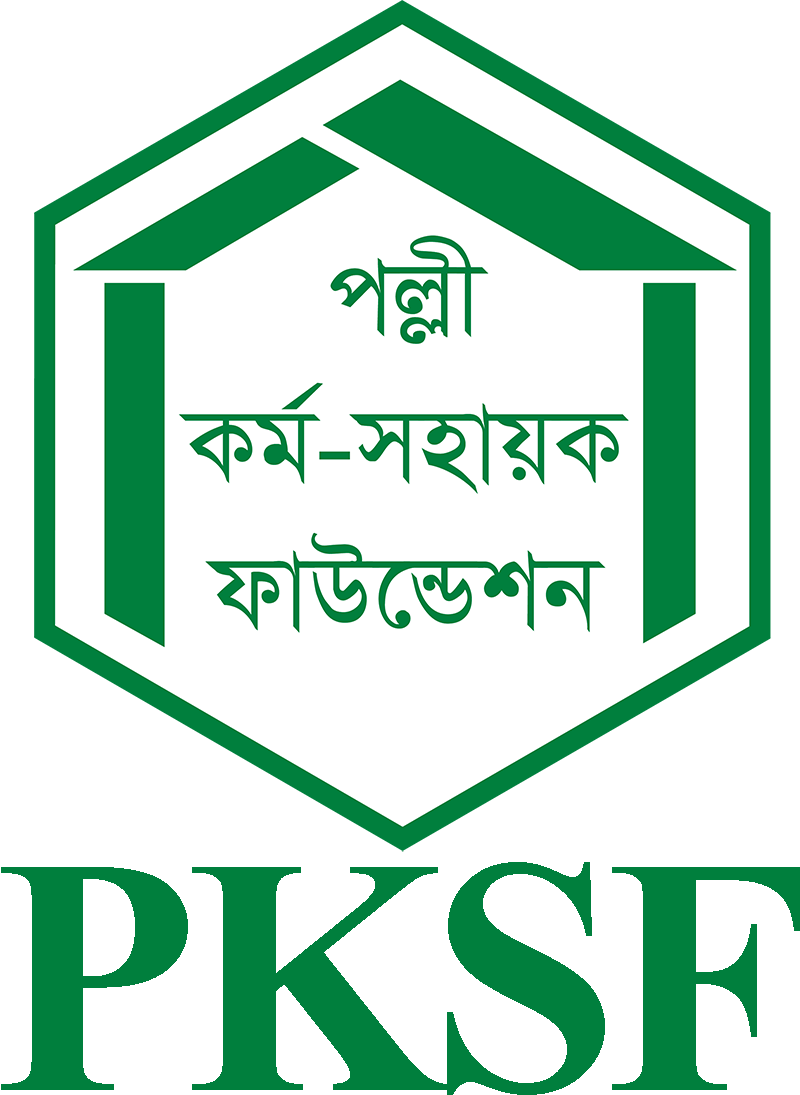To assist the microenterprises of Bangladesh in adopting environment-friendly business practices, PKSF has been implementing ‘Sustainable Enterprise Project (SEP)’ with support from the Government of Bangladesh since 2018. Co-funded by PKSF and The World Bank (WB), the 5-year project’s budget is $130 million, in which the WB and PKSF are financing $110 million and $20 million respectively.
In order to implement the project, the lead business groups in the agribusiness and manufacturing sectors are provided with financial and technical support to implement various committed activities. Currently, 64 sub-projects in 30 financial sub-sectors are underway.
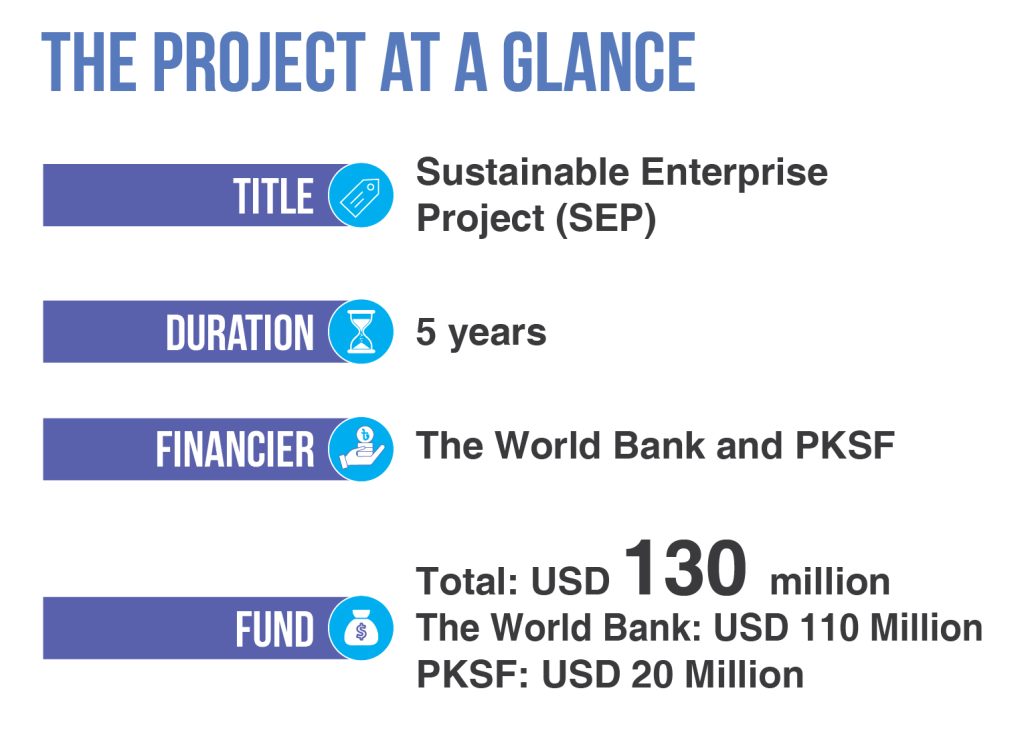
The objective of the project is to increase the adoption of environmentally sustainable practices by targeted microenterprises. A total of $89.50 million (BDT 716 crore approx.) has been approved by the PKSF management in favor of 47 Partner Organizations (POs) as loans. Of the amount, $84.65 million was disbursed among the POs till June 2022.
The SEP Project Management Unit (PMU) and the project-implementing POs provide training to develop skills, create awareness on various trades to its officials as well as the project participants. A total of 45,486 micro-entrepreneurs (female 20,684, male 24,802) have been trained on technical skill development, environmental awareness, market linkage, business certification, and environmental clearance in FY 2021-22.
SEP rated ‘Satisfactory’: The World Bank carried out the 7th Implementation Support Mission from 9-15 December 2021, and rated the project progress as ‘satisfactory’. Several presentations were made on different components of the project during the Mission. Some members of the WB team joined online from different parts of the world while some visited the SEP intervention sites. The World Bank rated SEP ‘satisfactory’ in the previous six missions as well.
80% microenterprises adopt environmental practices: More than 80 percent of the SEP- microenterprises adopted at least one environmentally sustainable practice (ESP) for their businesses, revealed a Mid-term Evaluation Report of SEP. The report was presented on 21 October 2021 at PKSF Bhaban by Pathmark Associate Limited. It also found that 78 percent of the MEs made commitment to continue such practices in the future.
World Bank VP visits project activities: Hartwig Schafer, the WB’s Vice President for South Asia Region visited the footwear microenterprise cluster at Bhairab in Kishoreganj on 8 December 2021. He was accompanied by PKSF Managing Director Dr Nomita Halder ndc; the WB’s Country Director Mercy Miyang Tembon, PKSF’s Additional Managing Director Md Fazlul Kader, and other representatives from government bodies, the WB and project-implementing POs of PKSF. They spoke with the service providers and learned about the services there.
Workshop on innovative information management: A knowledge-sharing workshop titled ‘Adoption of Environmentally Sustainable Practices and Environmental Certifications by MEs’ was held from 28 March to 5 April 2022. Objectives of the workshop was to share cutting-edge knowledge, discuss innovative data management and digitalization, explore financing instruments, and alternatives to enhance policy consistency to better implement environmentally sustainable practices. Dr Nomita Halder ndc, Managing Director, PKSF inaugurated the event followed by the opening remarks by Additional Managing Director Md Fazlul Kader, and the WB’s Senior Environment Specialist Eun Joo Allison Yi. Mercy Miyang Tembon, Country Director of the World Bank, was present at the closing session of the workshop. Researchers, experts, and professionals from different countries around the globe spoke on policies of different countries, big data management, digital financing, innovations, and green financing in different sessions of the workshop.
Applying Nudge theory: SEP has started applying Nudge theory on the field to sustainably change the behavior of the micro-entrepreneurs towards growth and environment. SEP devised a communication strategy and action plan based on the Nudge theory to apply in the fields. The theoretical base of the theory is to devise a design of choices that influence people’s decisions. It can be very useful in terms of changing behavior sustainably.
Project Objective:
“To increase the adoption of environmentally sustainable practices by targeted microenterprises.”
Major Events:
- 22 June – 30 June 2020: Fourth Implementation Support Mission by the World Bank
- 23 February 2020: Field visit by officials of the World Bank
- 14 January 2020: Delegation meeting on SEP between the Practice Manager of the World Bank and the Managing Director of PKSF
- 30 December 2019: Workshop on the second round of Call for Proposal for Sub-project Concept Notes (SPCNs) from the Partner Organizations (POs)
- 12 December 2019: Consultation meeting on environmental issues and possible mitigation measures
- 05 December 2019: Sixth meeting of SPCN Evaluation Internal Committee
- 24 November – 05 December 2019: Third Implementation Support Mission by the World Bank
- 03 November 2019: Third round of call for Detailed Sub-project Proposals (DSPPs)
- 21 October 2019: Fifth meeting of the Technical Committee
- 17 October 2019: Fourth meeting of the Technical Committee
- 03 October 2019: Fifth meeting of SPCN Evaluation Internal Committee
- 22 May 2019: Workshop on Call for DSPPs
- 25 April 2019: First phase of Agrosor loan disbursement under SEP
- 08 – 21 April 2019: Second Implementation Support Mission by the World Bank
- 18 April 2019: Fourth meeting of SPCN Evaluation Internal Committee
- 29 January 2019: Third meeting of SPCN Evaluation Internal Committee
- 21 January 2019: Second meeting of SPCN Evaluation Internal Committee
- 18 December 2018: First meeting of SPCN Evaluation Internal Committee
- 07-08 October 2018: Workshop on Request for Expressions of Interest (REOI) for SPCNs from the POs
- 03 – 18 September 2018: First Project Implementation Support Mission
- 08 August 2018: Official declaration of the project’s effectiveness by the World Bank
- 02 August 2018: Signing of Subsidiary Loan and Grant Agreement (SLGA)
- 02 July 2018: Field visit by the Executive Director, the World Bank
- 16 May 2018: Signing of the Project Agreement and of the Financial Agreement
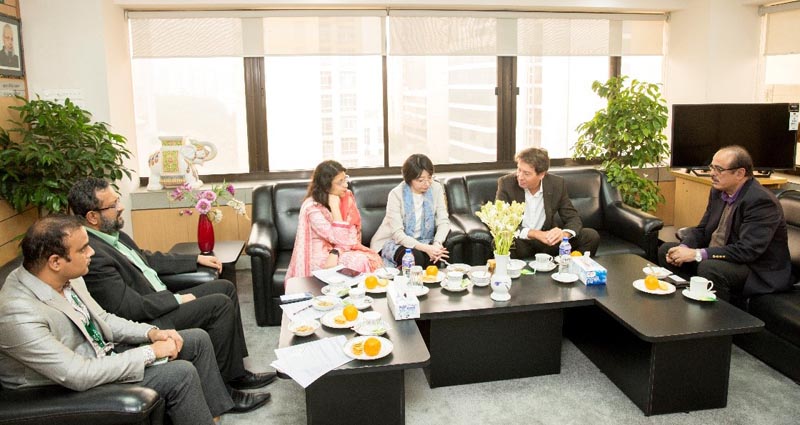
Mr Christophe Crepin, Practice Manager, Environment Natural and Blue Economy, the World Bank in a courtesy call on Mr Mohammad Moinuddin Abdullah, Managing Director of PKSF, to discuss the prospects of SEP. Mr Md Fazlul Kader, Deputy Managing Director-1, PKSF; Mr Md Rawshan Habib, Deputy Project Coordinator, Sustainable Enterprise Project (SEP), PKSF; Ms Suiko Yoshijima, Task Team Leader(TTL)-SEP, the World Bank; Dr Nadia Sharmin, Co-TTL-SEP, the World Bank were also present at the meeting.
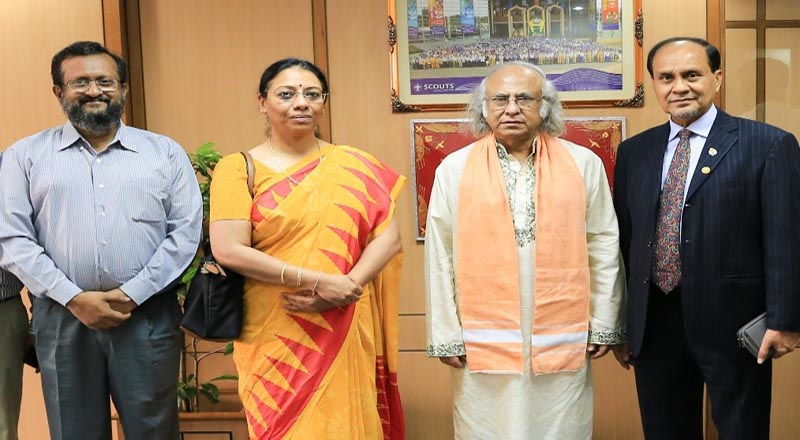
Ms Aparna Subramani, Executive Director (Bangladesh, Bhutan, India, Nepal), the World Bank poses with PKSF Chairman Dr Qazi Kholiquzzaman Ahmad, Mr Md Abdul Karim, the then Managing Director of PKSF, and Mr Md Fazlul Kader, Deputy Managing Director, PKSF during a courtesy meeting.
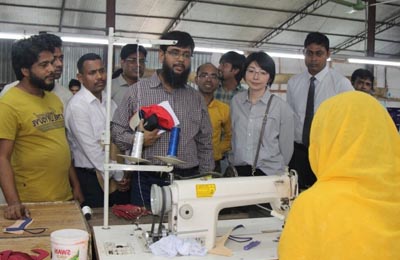 Field visit by the World Bank
Field visit by the World Bank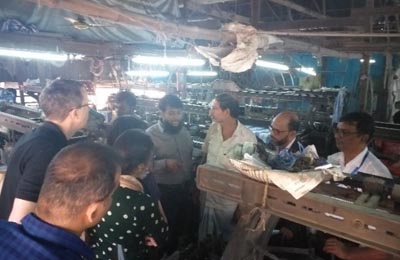 Field visit during the 3rd Implementation Mission of the World Bank
Field visit during the 3rd Implementation Mission of the World Bank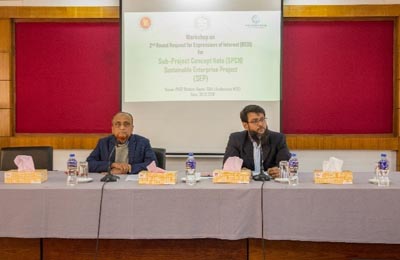 Workshop on the 2nd Round Call for SPCNs
Workshop on the 2nd Round Call for SPCNs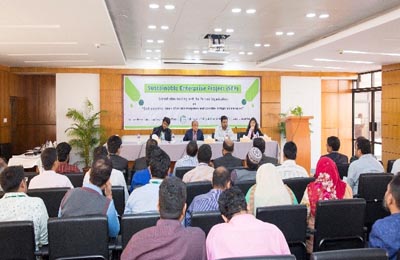 Consultation meeting on Environmental Issues and Mitigation Measures
Consultation meeting on Environmental Issues and Mitigation Measures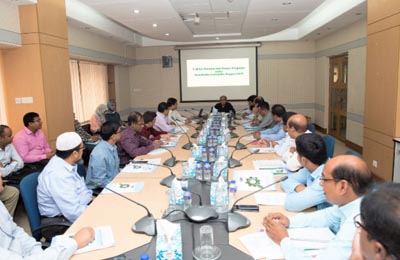 The 3rd Round Call for DSPPs
The 3rd Round Call for DSPPs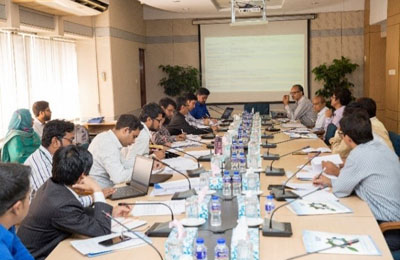 Technical Committee Meeting
Technical Committee Meeting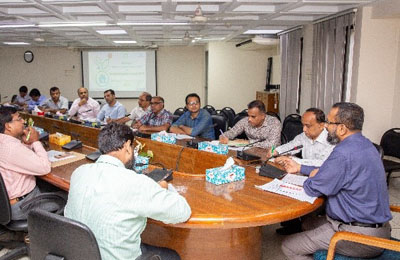 Call for Detailed Sub-Project Proposals (DSPPs)
Call for Detailed Sub-Project Proposals (DSPPs)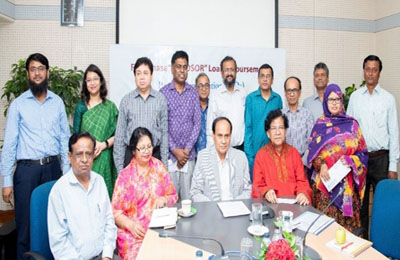 First Phase of Agrosor Loan disbursement under SEP
First Phase of Agrosor Loan disbursement under SEP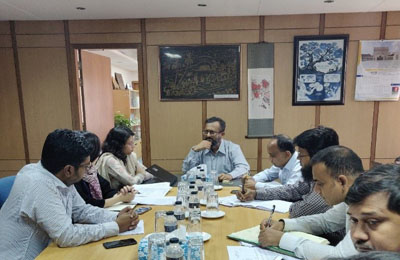 The 2nd Implementation Support Mission of the WB
The 2nd Implementation Support Mission of the WB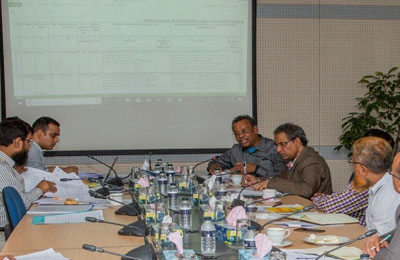 First internal evaluation meeting on submitted SPCNs
First internal evaluation meeting on submitted SPCNs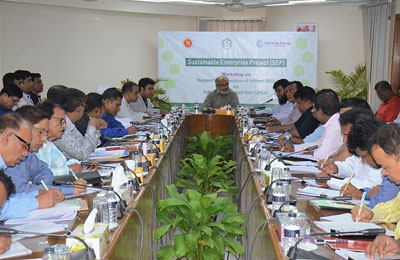
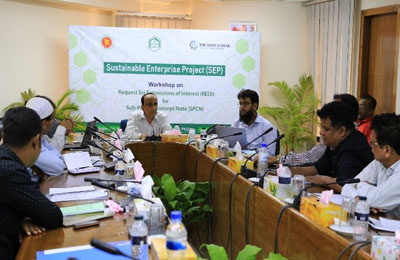
Mr Golam Touhid, Deputy Managing Director-3 of PKSF and Dr Akond Md Rafiqul Islam, Senior General Manager, PKSF at the workshop on REOI for filling up the SPCNs with the officials of primarily selected POs
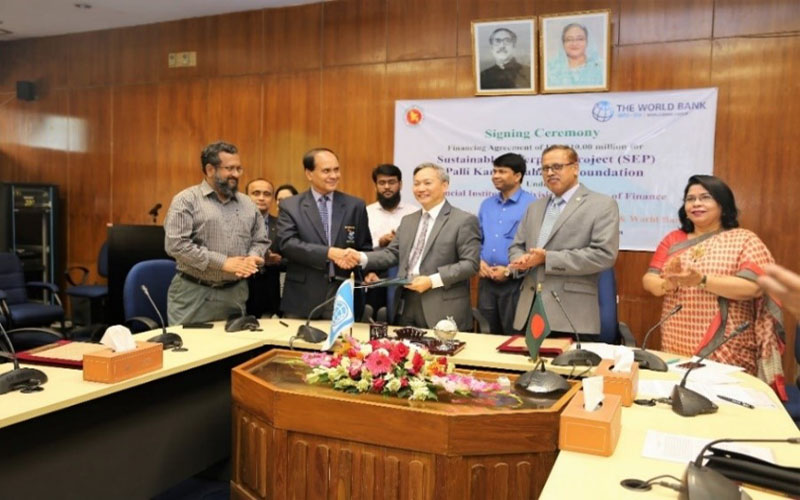
Signing of the Project Agreement of SEP by Mr Md Abdul Karim, the then Managing Director of PKSF, and Mr Qimiao Fan, Country Director of the World Bank, in the presence of Mr Kazi Shofiqul Azam, Senior Secretary, Economic Relations Division, Ministry of Finance, and Mr Md Fazlul Kader, Deputy Managing Director of PKSF, Mr Zahir Uddin Ahmed, Project Coordinator-SEP and other officials from PKSF and the World Bank.
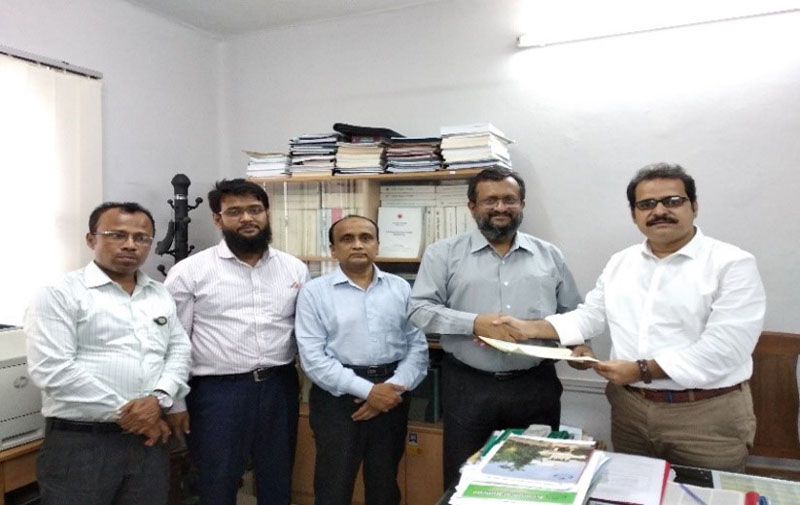
Signing of the SLGA on Sustainable Enterprise Project (SEP) by Mr Md Fazlul Kader, Deputy Managing Director of PKSF and Mr Shirajun Noor Chowdhury, Deputy Secretary, Finance Division, Ministry of Finance.
Project Components:
The first of the three components of SEP will support common services influencing non-revenue-generating physical activities to be environmentally sustainable through enhancing low polluting businesses as well as increased eco-labeling, product certification, brand development and access to premium markets. Besides, POs’ capacity development and revenue-generating common services are included in this component.
The project, through component-2, will be extending financial support for income-generating opportunities to the targeted microenterprises by supporting investment in activities — which are resource-efficient, low polluting, green and resilient — through Partner Organizations (POs) as Agrosor loan.
Under the component-3, a Project Management Unit (PMU) will ensure the project implementation in a timely and effective manner. It also includes activities for PKSF/PO-level capacity building, facilitating communication and knowledge management, printing-publications, sub-sector studies, and monitoring and evaluation (M&E).
Project Development Objectives (PDO)-level Results Indicators:
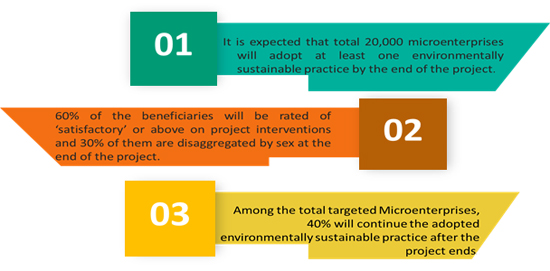
Covid-19-focused activities under SEP:
In March 2020, the Government of Bangladesh declared general holidays to check the spread of Covid-19 pandemic in the country. As a result, like all other sectors, the activities of micro-entrepreneurs under SEP was immensely affected. The SEP Project Management Unit provided support to the micro-entrepreneurs and the POs implementing the sub-projects at the field. The PMU activities in the wake of Covid-19 pandemic are as follows:
Awareness activities: Emergency awareness activities on personal safety and hygiene have been conducted in line with Covid-19 information from the Institute of Epidemiology, Disease Control and Research (IEDCR) and the World Health Organization (WHO). Appropriate guidelines have been provided to the partners to raise awareness among the MEs. Leaflet and poster distribution, disseminating awareness messages through loudspeakers, establishing hand washing booths, and disinfecting public spots are some of the activities undertaken by the POs to generate awareness against Covid-19. In addition, with guidance from the PMU, the POs regularly sent short messages or text messages to the micro-entrepreneurs.
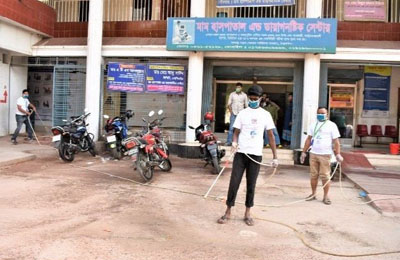
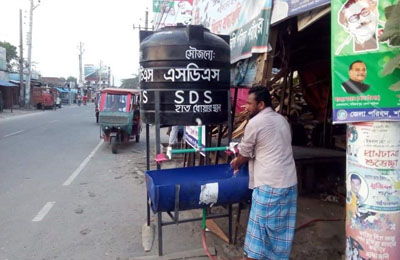
Loan activities: As per the directives of the Government of Bangladesh, the PMU of SEP ensured that all the Partner Organizations to suspend the loan disbursement activities.
Constant communication: The PMU maintained constant communication with the project-related officers of the POs, who in turn always stayed in touch with the micro-entrepreneurs concerned. They would send regular updates from the field.
Training program: A special handout on Covid-19 Health and Safety Training was prepared by the PMU of SEP. The PO officials have already received this training so that they can create awareness among the micro-entrepreneurs with the information obtained from this training.
Provision of technical assistance: Micro-entrepreneurs in the poultry, livestock and fisheries sub-sectors have been adversely affected due to disruption in transport during the Covid-19-induced general holidays. In order to insulate micro-entrepreneurs from economic loss in these sub-sectors, the PMU, through the POs, provided technical advice including on feeding cattle with minimum feed, converting raw milk to dairy products like ghee, cheese etc.
Introduction of alternative markets: The PMU encouraged the MEs to explore alternative markets/supply channels through online marketing. MEs from SEP’s Fruit (Mango) and Dairy Products sub-sectors were connected to the e-commerce platforms through POs, which enabled them to market their products even during the strict restricts of transport movements.
Strengthening online communication: The PMU has strengthened its online communication channels with the POs in the field. In addition to regular internal meetings, the PMU conducted additional meetings through teleconferencing. Meetings with external experts were held online as well. Regular online meetings are held with the PO officials concerned.
Making and distributing PPE: The Project Management Unit provided technical assistance to micro-entrepreneurs in manufacturing masks and personal protective equipment. Under the SEP, MEs from the Mini-Garments sub-sector are producing personal protective materials with the technical assistance of the PMU. POs distributed these products among MEs in other sub-sectors and local people.
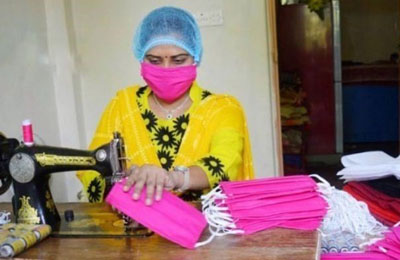
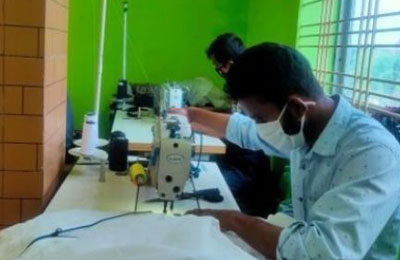
Development of Sector-Specific COVID-19 Protocol:
The PMU developed sector-specific COVID-19 protocols in compliance with the personal safety and health regulations issued by the Institute of Epidemiology, Disease Control and Research (IDCR) of Bangladesh and the World Health Organization (WHO). Complying with these protocols are helping MEs stay safe from contracting Covid-19 while continuing business activities during this pandemic.
